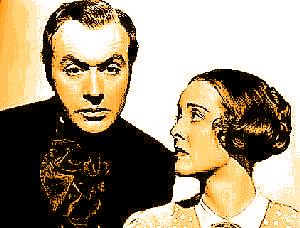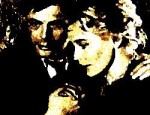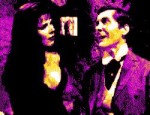Film Review

Although stylistically the film is impressive, it has some notable flaws on both the scripting and acting front. Neither Bette Davis nor Charles Boyer are particularly convincing in their roles. As the morally unblemished nanny, Davis has the handicap of playing against type - she is far more believable, and gives far more value, as the 'bad girl', in such films as In This Our Life (1942) and The Letter - and Boyer is far too comfortable in the role of the seductive lover. Whilst they make an engaging screen couple, it is hard to warm to either of them. However, it is Barbara O'Neil's performance that really punctures the bubble of credibility - a totally over-the-top portrayal of female nastiness that has you constantly looking at the screen for sign of a broomstick.
One of the reasons why the performances aren't quite up to the mark is the quality of the script. Even for 1940s Hollywood, the dialogue sounds stilted and unbearably schmaltzy in places (and yet beautifully poetic in others). The characters are too clearly delineated into good and bad, with the result that most end up as predictable caricatures. There an no surprises - the way the characters behave, indeed most of the plot developments, are almost exactly as you would expect, and this robs the film of much of its dramatic impact.
And yet, despite these obvious faults, and despite the fact it is at least thirty minutes too long, All This, and Heaven Too is an engaging film, directed with great flair and beautifully shot. It is a simple story of unrequited love told in a way that is naïve yet also rather endearing.
© James Travers 2007
The above content is owned by frenchfilms.org and must not be copied.
Film Synopsis
In the 1840s, French teacher Henriette Deluzy arrives in America and finds work in a girls' school. When her pupils pick up on rumours of her recent past, she decides to tell them her story. A few years ago, Henriette was engaged as governess to the aristocratic Praslin family. The Duke, her employer, is impressed by the compassionate way in which she treats his three young daughters and his weakling son, and begins to fall in love with her. Realising that the new governess is monopolising the interest of her husband and her children, the Duchess becomes consumed by a jealousy that will ruin all of their lives...© James Travers
The above content is owned by frenchfilms.org and must not be copied.
Similar Films
Here are some other films you may enjoy watching:- Marius (1931)
- Forbidden (1932)
- Les Amants de Vérone (1949)
- Le Duel (1939)
- Entrée des artistes (1938)
Other related links:
Film Credits
- Director: Anatole Litvak
- Script: Rachel Field, Casey Robinson (play)
- Cinematographer: Ernest Haller
- Music: Max Steiner
- Cast: Bette Davis (Henriette Deluzy-Desportes), Charles Boyer (Duc de Praslin), Jeffrey Lynn (Henry Martyn Field), Barbara O'Neil (Duchesse de Praslin), Virginia Weidler (Louise), Helen Westley (Madame LeMaire), Walter Hampden (Pasquier), Henry Daniell (Broussais), Harry Davenport (Pierre), George Coulouris (Charpentier), Montagu Love (Marechal Sebastiani), Janet Beecher (Miss Haines), June Lockhart (Isabelle), Ann E. Todd (Berthe), Richard Nichols (Reynald), Fritz Leiber (Abbe Gallard), Ian Keith (DeLangle), Sibyl Harris (Mlle. Maillard), Edward Fielding (Dr. Louis), Mary Anderson (Rebecca Jay)
- Country: USA
- Language: English / French
- Support: Black and White
- Runtime: 141 min
The very best of Italian cinema

The best of British film comedies

The best films of Ingmar Bergman
